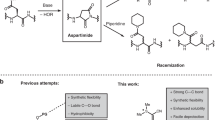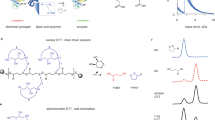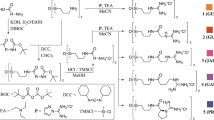Abstract
In experiments designed to determine the position of the —S—S— bonds in insulin, cystine peptides were separated from a partial acid hydrolysate, and their structures determined after oxidation to the corresponding cysteic acid peptides. It was found that many more cystine peptides were present than could be accounted for by any one unique structure for the insulin molecule, and it seemed likely that a transfer reaction of the type:  had taken place during the hydrolytic treatment, leading to a random rearrangement of the —S—S— bonds. That such a reaction can take place was illustrated by the following model experiment, in which mono-2 : 4-dinitrophenyl-cystine is formed from a mixture of cystine and bis-2 : 4-dinitrophenyl-cystine.
had taken place during the hydrolytic treatment, leading to a random rearrangement of the —S—S— bonds. That such a reaction can take place was illustrated by the following model experiment, in which mono-2 : 4-dinitrophenyl-cystine is formed from a mixture of cystine and bis-2 : 4-dinitrophenyl-cystine.
This is a preview of subscription content, access via your institution
Access options
Subscribe to this journal
Receive 51 print issues and online access
$199.00 per year
only $3.90 per issue
Buy this article
- Purchase on Springer Link
- Instant access to full article PDF
Prices may be subject to local taxes which are calculated during checkout
Similar content being viewed by others
References
Dudley, H. W., Biochem. J., 17, 376 (1923).
Huggins, C., Tapley, D, F., and Jensen, E. V., Nature, 167, 592 (1951).
Author information
Authors and Affiliations
Rights and permissions
About this article
Cite this article
SANGER, F. A Disulphide Interchange Reaction. Nature 171, 1025–1026 (1953). https://doi.org/10.1038/1711025a0
Issue Date:
DOI: https://doi.org/10.1038/1711025a0
This article is cited by
-
A novel, robust peptidyl-lys metalloendopeptidase from Trametes coccinea recombinantly expressed in Komagataella phaffii
Applied Microbiology and Biotechnology (2024)
-
Recent mass spectrometry-based techniques and considerations for disulfide bond characterization in proteins
Analytical and Bioanalytical Chemistry (2018)
-
Conductive carbon tape as a sample platform for microwave-based MALDI MS detection of proteins and phosphoproteins
Analytical and Bioanalytical Chemistry (2011)
Comments
By submitting a comment you agree to abide by our Terms and Community Guidelines. If you find something abusive or that does not comply with our terms or guidelines please flag it as inappropriate.



